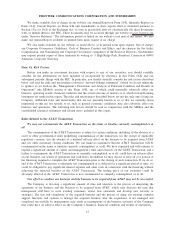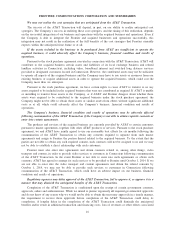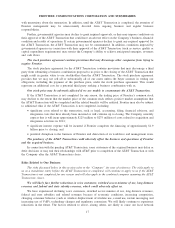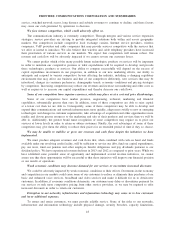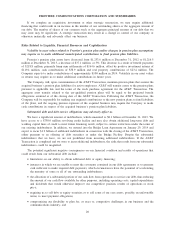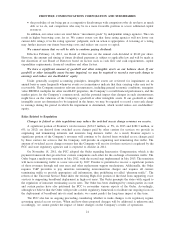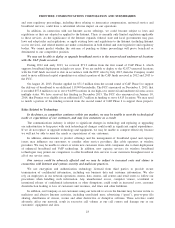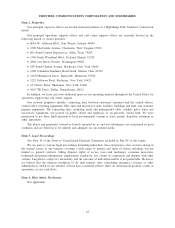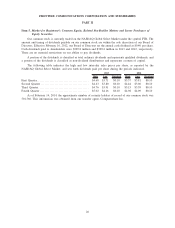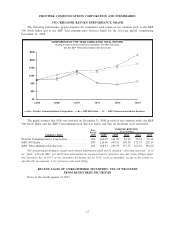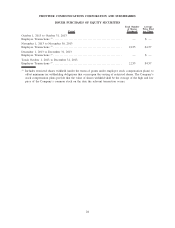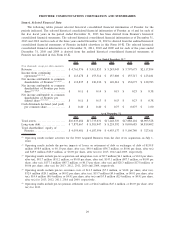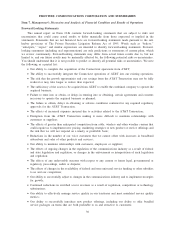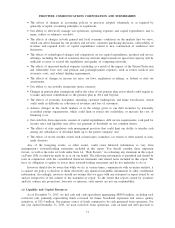Frontier Communications 2013 Annual Report Download - page 23
Download and view the complete annual report
Please find page 23 of the 2013 Frontier Communications annual report below. You can navigate through the pages in the report by either clicking on the pages listed below, or by using the keyword search tool below to find specific information within the annual report.Certain states also have their own open proceedings to address reform to intrastate access charges and
other intercarrier compensation and state universal service funds. Although the FCC has pre-empted state
jurisdiction on most access charges, many states could consider moving forward with their proceedings. We
cannot predict when or how these matters will be decided or the effect on the Company’s subsidy or switched
access revenues. However, future reductions in the Company’s subsidy or switched access revenues may
directly affect the Company’s profitability and cash flows as those regulatory revenues do not have an equal
level of associated variable expenses.
We are reliant on support funds provided under federal and state laws.
A significant portion of Frontier’s total revenues ($317.1 million in the aggregate, or 7%, in 2013 and
$324.6 million in the aggregate, or 6%, in 2012) are derived from federal and state subsidies for rural and high-
cost support, commonly referred to as universal service fund subsidies (USF). Future reductions in the
Company’s subsidy revenues may directly affect the Company’s profitability and cash flows. The FCC’s Order
changed how federal subsidies will be calculated and disbursed, with these changes being phased-in beginning
in 2012. These changes transition the Federal Universal Service High-Cost Fund, which supports voice services
in high-cost areas, to the CAF, which supports broadband deployment in high-cost areas. CAF Phase I,
implemented in 2012, provided for ongoing USF support for price cap carriers capped at the 2011 amount. In
addition, the FCC in the first round of CAF Phase I made available for price cap ILECs an additional $300
million in incremental high-cost broadband support to be used for broadband deployment to unserved areas. On
July 24, 2012, Frontier formally notified the FCC and appropriate state commissions of its intent to accept all
of the funds for which it was eligible, amounting to $71.9 million. The $71.9 million in the first round of CAF
Phase I support is expected to enable an incremental 92,877 households for broadband service and will be
accounted for as Contributions in Aid of Construction. We are required to spend the CAF Phase I funds on and
enable these 92,877 households no later than July 24, 2015. We have received the entire $71.9 million of the
first round of CAF Phase I support funds and we initially recorded such funds as increases to Cash and Other
liabilities in the balance sheet.
On May 21, 2013, the FCC released a Report and Order authorizing a second round of CAF Phase I. As
part of this May 2013 Report and Order, the FCC expanded the areas eligible for funding to include those that
lack service of 3Mbps download and 768 kbps upload. In 2013, Frontier applied for funds from the second
round of CAF Phase I and in December 2013 the FCC awarded $57.6 million to us to serve 94,899 locations in
our high-cost, unserved and underserved areas across multiple states. The FCC also announced on January 10,
2014, that Frontier was eligible for an additional $3.7 million in funding to serve 6,815 locations. We may need
to match a portion of the funding received from the second round of CAF Phase I to support these projects.
Federal subsidies representing interstate access support, high-cost loop support and local switching support
represented $167.2 million, or 4%, of Frontier’s total revenues in 2013 and $160.7 million, or 3%, of Frontier’s
total revenues in 2012. State subsidies represented $32.4 million, or 1%, of Frontier’s total revenues in 2013
and $44.2 million, or 1%, in 2012. Surcharges to customers (local, long distance and interconnection) to
recover universal service fund contribution fees which are remitted to the FCC and recorded as an expense in
“Other operating expenses”, represented $117.5 million, or 2%, of Frontier’s total revenues in 2013 and $119.7
million, or 2%, in 2012. As a result, a significant decrease in these subsidies, or in our ability to recover such
fees, could have a material adverse effect on our business or results of operations.
Our Company and our industry will likely remain highly regulated, and we could incur substantial
compliance costs that could constrain our ability to compete in our target markets.
As an incumbent local exchange carrier, some of the services we offer are subject to significant regulation
from federal, state and local authorities. This regulation could impact our ability to change our rates, especially
on our basic voice services and our access rates, and could impose substantial compliance costs on us.
Regulation could constrain our ability to compete and, in some jurisdictions, may restrict our ability to expand
our service offerings. In addition, changes to the regulations that govern our business (including any
implementation of the Order) may have an adverse effect on our business by reducing the allowable fees that
we may charge, imposing additional compliance costs, reducing the amount of subsidies or otherwise changing
the nature of our operations and the competition in our industry. At this time it is unknown how these
regulations will affect Frontier’s operations or ability to compete in the future. This and other FCC rulemakings
22
FRONTIER COMMUNICATIONS CORPORATION AND SUBSIDIARIES





